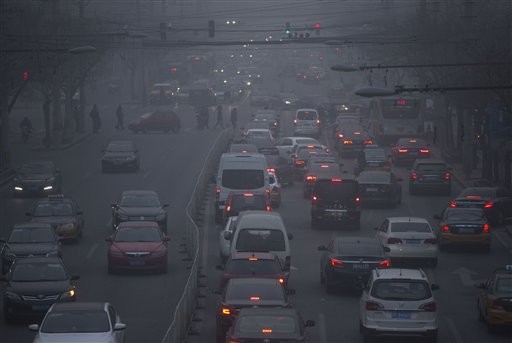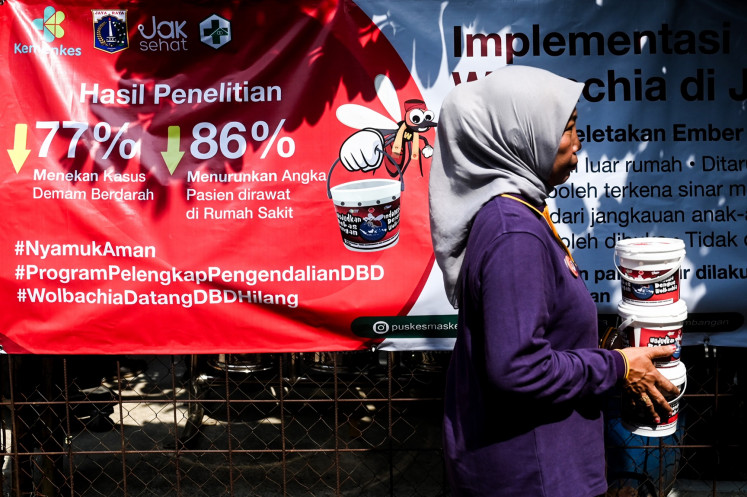Air pollution is damaging to mental health
There was a clear link between high air pollution and decreased levels of organizational citizenship behavior. We also observed that increased pollution saw a corresponding and marked increase in counterproductive workplace behavior.
Change text size
Gift Premium Articles
to Anyone
 Pedestrians make their way across a busy intersection on a day with severe air pollution in Beijing, Dec. 25, 2015. (AP/Mark Schiefelbein)
Pedestrians make their way across a busy intersection on a day with severe air pollution in Beijing, Dec. 25, 2015. (AP/Mark Schiefelbein)
E
arth Day helps create awareness on how environmental issues affect us all. And one of the biggest challenges we face today is the health effects brought by airborne pollution.
Every year, the region’s air is choked by the haze. The haze last year was one of the worst on record. Cities in Sumatra and Kalimantan saw more than 500,000 cases of acute respiratory tract infections have been reported between July and October. The region’s Pollutant Standard Index ( PSI ) reached close to 2,000. Anything above 300 is considered hazardous.
Although the health effects of air pollution are apparent, less known is the psychological effect it has on our behavior and consequently our performance in the workplace.
In our study we focused on a behavioral theory known as ego depletion — the idea that an individual’s self-control draws upon a limited pool of mental resources; one that can be used up and needs opportunities to restore.
Air pollution can drain our self-control resources psychologically, causing a range of conditions including insomnia, feelings of anxiety or even depression.
Through a diary-based study of 161 full-time employees in various industries, our research examined how pollution affects two kinds of behavior — organizational citizenship behavior and counterproductive workplace behavior.
Organizational citizenship behavior relates to employee actions that contribute towards the functioning of the firm, but are optional and not specifically part of their job. These include an individual’s willingness to help others or to engage with their team beyond their job scope.
Counterproductive behavior is the opposite. These include working on personal matters during work hours, as well as rudeness, hostility or even outright bullying towards colleagues.
We asked participants for their perception of pollution levels, their level of mental resource depletion as well as organizational citizenship and counterproductive workplace behaviors.
There was a clear link between high air pollution and decreased levels of organizational citizenship behavior. We also observed that increased pollution saw a corresponding and marked increase in counterproductive workplace behavior.
We found that air pollution leads to a decrease in self-control resource, which in turn leads to increased counterproductive and decreased organizational citizenship behaviors. Specifically the data gathered showed that the severity of air pollution accounted for an average of around 10 percent of an individual’s daily self-control resource depletion.
The impact of air pollution makes us less giving or engaged at work and more deviant.
In line with ego depletion theory it is apparent that both the direct physiological impact of air pollution and the individual’s own perception of its severity act to deplete resources affecting self-control.
A worker may experience little or no health effects from pollution while another in the same office may suffer badly. Likewise one individual’s perception of what constitutes “severe” pollution may be very different from another.
An essential factor in determining an individual’s ability to manage the effects of drained self-control resources is the support they receive — or feel they receive — from those around them. For example, demonstrations of active support from the firm can go some way to replenish an employee’s mental resource pool.
Indeed our study also found that the negative effects of air pollution on employees’ behavior were mitigated when organizational support was high — i.e. when the employee perceived that their supervisor or firm was concerned for their well-being.
There were firms that were supportive by providing additional work breaks or the option to work from home on high pollution days, or they may provide easier and better access to healthcare.
While this favors the argument that firms should do all that they can to support employees exposed to severe air pollution, all of this comes with a cost to the firm.
The worse the pollution gets, the higher the costs multiply for business — so at a broader level the best option would obviously be if there were no pollution at all.
Unfortunately the cost of pollution to Indonesia’s economy is huge. In October last year, the Indonesian government estimated that the financial damage to its country could cost as high as US$35 billion. According to a World Bank study, for just the two months of February and March in 2014, the forest fires that caused the haze cost the Riau province S$935 million of lost productivity and trade.
By conducting studies like ours, we can better understand the true social and economic implications of pollution, and in turn add weight to the financial argument for stronger and more effective policies to tackle pollution at source.
***
The writer is assistant professor of management and organization at the National University of Singapore ( NUS ) Business School.
---------------
We are looking for information, opinions, and in-depth analysis from experts or scholars in a variety of fields. We choose articles based on facts or opinions about general news, as well as quality analysis and commentary about Indonesia or international events. Send your piece to community@jakpost.com.









